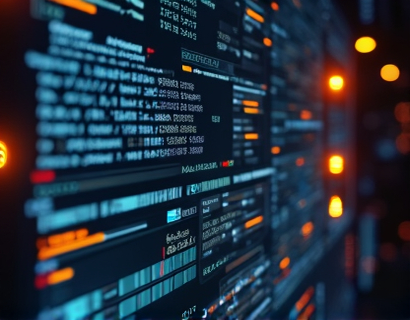The Synergy of AI and Crypto: Revolutionizing Digital Finance
The intersection of artificial intelligence and cryptocurrency is giving birth to a new era in digital finance, one that promises unparalleled efficiency, security, and innovation. This transformative synergy is not just a buzzword but a tangible shift in how financial services are delivered and experienced. As we delve into this topic, we will explore the various ways AI and crypto are merging to create intelligent solutions that are redefining the landscape of FinTech.
Understanding the Basics: AI and Cryptocurrency
To fully appreciate the impact of AI on cryptocurrency, it's essential to understand the fundamentals of both technologies. Artificial intelligence, a branch of computer science, involves the development of algorithms and systems that can perform tasks requiring human intelligence, such as learning, reasoning, and self-correction. On the other hand, cryptocurrency is a digital or virtual currency that uses cryptography for security and operates on a decentralized network, most notably blockchain technology.
Cryptocurrencies like Bitcoin and Ethereum have already disrupted traditional financial systems by offering a decentralized alternative to fiat currencies. The blockchain, the underlying technology, ensures transparency, immutability, and security through a distributed ledger that records all transactions across a network of computers. This technology has the potential to revolutionize not just finance but various sectors by providing a trustless and efficient way to conduct transactions.
AI in Cryptocurrency: Enhancing Security and Efficiency
One of the most significant contributions of AI to cryptocurrency is in the realm of security. Traditional security measures often fall short against sophisticated cyber threats. AI-driven security solutions can detect and respond to anomalies in real-time, predicting and preventing potential attacks. Machine learning algorithms analyze vast amounts of data to identify patterns and anomalies, enhancing the overall security of crypto assets.
Moreover, AI improves the efficiency of cryptocurrency transactions. Smart contracts, self-executing contracts with the terms directly written into code, can automate and enforce contractual obligations without the need for intermediaries. AI can optimize the execution of these smart contracts, ensuring they are executed under the most favorable conditions, reducing costs and increasing speed.
Predictive Analytics in Crypto Markets
Another area where AI shines is in predictive analytics. The cryptocurrency market is notoriously volatile, making it challenging for investors to make informed decisions. AI algorithms can analyze historical data, market trends, and even social media sentiment to predict price movements. These predictions can help traders and investors make more informed decisions, potentially leading to higher returns and reduced risks.
Moreover, AI can provide insights into market sentiment by analyzing vast amounts of unstructured data, such as news articles, social media posts, and forum discussions. Natural language processing (NLP) techniques enable AI to gauge the overall sentiment of these sources, which can be a powerful indicator of market direction.
Personalized Financial Services
The integration of AI and cryptocurrency is not limited to security and efficiency; it also opens up new possibilities for personalized financial services. AI can analyze individual user data to provide tailored investment advice, portfolio management, and financial planning. This level of personalization is particularly valuable in the crypto space, where the diversity of assets and the complexity of the market can be overwhelming for many users.
Robo-advisors, powered by AI, can create and manage customized investment portfolios based on a user's risk tolerance, investment goals, and market conditions. These AI-driven advisors can continuously monitor and adjust portfolios to optimize performance, offering a level of service that traditional financial advisors may not be able to match.
Decentralized Finance (DeFi) and AI
Decentralized Finance, or DeFi, is an emerging sector that leverages blockchain technology to create financial services without traditional intermediaries. AI plays a crucial role in enhancing DeFi platforms by improving liquidity, risk management, and user experience. AI algorithms can optimize liquidity pools, ensuring that they are well-capitalized and efficient, which is essential for the smooth functioning of DeFi protocols.
Risk management in DeFi is another area where AI excels. By analyzing historical data and real-time market conditions, AI can identify potential risks and suggest strategies to mitigate them. This is particularly important in DeFi, where the lack of central authority means that users must be vigilant about managing their own risks.
Cross-Chain Interoperability
As the crypto ecosystem grows, the need for cross-chain interoperability becomes increasingly important. AI can facilitate seamless interactions between different blockchain networks, enabling the transfer of assets and data across platforms. This interoperability is crucial for building a more connected and efficient financial system.
AI-driven solutions can optimize routing and transaction processes, ensuring that cross-chain operations are fast, secure, and cost-effective. This not only enhances the user experience but also opens up new opportunities for developers to create innovative applications that span multiple blockchain networks.
Challenges and Considerations
While the potential of AI in the crypto space is vast, there are several challenges and considerations that must be addressed. One of the primary concerns is regulatory compliance. The crypto industry is still in its early stages of regulation, and AI-driven solutions must navigate a complex and evolving legal landscape. Ensuring that AI systems comply with existing regulations and anticipate future changes is crucial for their success.
Another challenge is the ethical use of AI. As AI systems become more autonomous, questions about accountability, bias, and transparency arise. It's essential for developers and organizations to prioritize ethical AI practices, ensuring that these technologies are used responsibly and benefit society as a whole.
The Future of AI and Crypto
Looking ahead, the synergy between AI and cryptocurrency is poised to drive significant advancements in digital finance. As AI technologies continue to evolve, we can expect even more sophisticated applications in areas such as quantum-resistant cryptography, advanced predictive analytics, and enhanced user interfaces.
The integration of AI with blockchain and other decentralized technologies will likely lead to the creation of more resilient, efficient, and user-friendly financial systems. This future holds the promise of financial inclusion, where individuals in underserved regions can access a wide range of financial services through decentralized platforms powered by AI.
In conclusion, the combination of AI and cryptocurrency is not just a technological trend but a fundamental shift in how we think about and interact with financial systems. As we continue to explore and harness this synergy, we can expect a future where digital finance is more secure, efficient, and tailored to the needs of users worldwide.










































